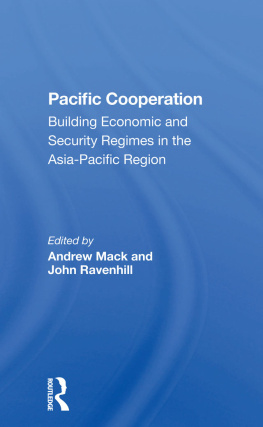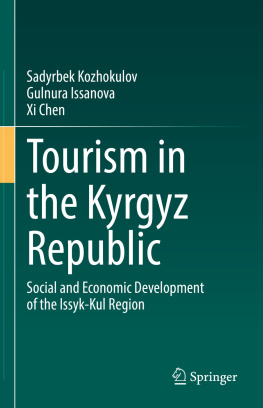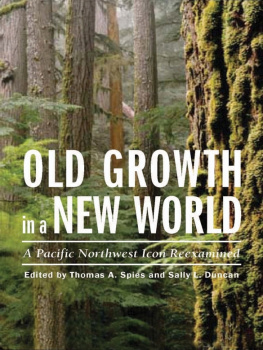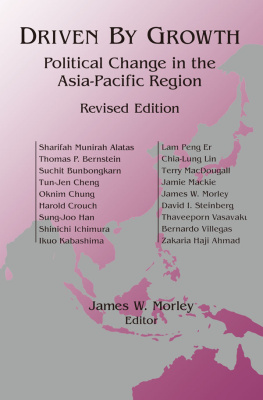Published in 2005 by
Routledge
711 Third Avenue
New York, NY 10017
www.routledge-ny.com
Published in Great Britain by
Routledge
2 Park Square
Milton Park, Abingdon
Oxon OX14 4RN U.K.
www.routledge.co.uk
Copyright 2005 by Routledge
Routledge is an imprint of the Taylor & Francis Group.
All rights reserved. No part of this book may be reprinted or reproduced or utilized in any form or by any electronic, mechanical, or other means, now known or hereafter invented, including photocopying and recording, or in any information storage or retrieval system without permission in writing from the publisher.
Library of Congress Cataloging-in-Publication Data
Prudham, W. Scott.
Knock on wood: nature as commodity in Douglas-fir country / W. Scott Prudham.
p. cm.
Includes bibliographical references and index.
ISBN 0-415-94401-5 (hardback: alk. paper)ISBN 0415-944023 (pbk.: alk. paper)
ISBN: 978-1-136-07234-5 (epub)
1. Lumber tradeEnvironmental aspectsNorthwest, Pacific. 2. Environmental policyNorthwest, Pacific. 3. Forests and forestryEconomic aspectsNorthwest, Pacific. I. Title.
HD9757.N95P78 2004
333.7509795--dc22
2004011850
Acknowledgments
This book is the result of the contributions of many. I want first to acknowledge the generous financial support of the Social Sciences and Humanities Research Council of Canada, which furnished me with a doctoral fellowship and a postdoctoral fellowship. I also was fortunate to be supported under a grant from the John D. and Catherine T. MacArthur Foundation. The University of California at Berkeley provided me with a Muriel McKevitt Sonne Graduate Fellowship and Non-Resident Tuition Scholarship and the Chancellors Dissertation Writing Fellowship. Berkeley is a wonderful place to be a graduate student, as is the city by the Bay, and I wish to thank numerous people whom I cannot name here who help make it soprofessors, staff, students, residents. I loved it there, and I miss it.
I owe special thanks to the excellent staff of the Energy and Resources Group: Kate Blake, Donna Bridges, Sandra Dovali, Tony Folger-Brown, LaShaun Howard, and Lee Tajkakhsh; I would not have survived without your help. I also benefited immeasurably from graduate seminars and the miscellaneous contributions of graduate students, particularly the amazing students in the Energy and Resources Group. Courses offered by Peter Berck, Anthony Fisher, Louise Fortmann, Michael Watts, Rachel Schurman, Richard Walker, and Peter Evans were very helpful, and I owe my thanks to these people for helping me organize and situate my ideas. I also received valuable academic advice from Laura Enriquez, Louise Fortmann, Richard Howarth, Anne Kapuscinski, Laura Nader, Nancy Peluso, and Geoff Romm. Dick Norgaard was extremely patient with me and remained my advocate throughout my years in the Energy and Resources Group. Dick Walker gave me excellent and timely advice even though I was not a geography student, he respected me enough to tell me the truth (even when it hurt!), and he encouraged me even when the products of my efforts were less than good. Dick also has been instrumental in seeing this book published, and I owe him a deep debt of gratitude for continuing to help me after I left Berkeley.
Rachel Schurman was a stalwart, a constant enthusiast, a careful critic, and a good friend. I also had the benefit and privilege of working with an excellent study club at Berkeley in preparing my research prospectus. Thanks for the inspiration, the perspiration, and the fun along the way to the members of What Is the Question?: William Boyd, Sidney Bob Dietz II, Navroz Dubash, Denny Kelso, James McCarthy, Dara ORourke, Paul Sabin, and Thomas Sikor. In some ways, you were every bit my supervisory committee.
I also want to acknowledge Steve Lonergan of the University of Victoria who stands tall among the weeds and who encouraged me to pursue my studies at Berkeley way back when. Trevor Barnes read my dissertation carefully and offered invaluable help in the revisions for this book. Juanita Sundberg was very supportive and helpful through the writing of much of this book. Thanks to the numerous people who helped me in my research, including those who consented to being interviewed and those who assisted me in other capacities. This includes the people of the Illinois Valley, and particularly those of Takilma, for allowing me into their community. I had the privilege of working and playing with Erik Jules, Marcus Kaufmann, and Matt Kaufmann during the summer of 96, and with Matt again in 97. Thank you TORCH; flame on.
Thanks also to a number of very helpful professors and researchers at Oregon State University and helpful staff members of the U.S. Forest Service, the Bureau of Land Management, and the International Woodworkers of America. I also owe thanks to Alex Murphy and Carolyn Cartier (formerly) of the University of Oregons Geography Department and to Bill Robbins of Oregon State University for their support during fieldwork. Robin Jane Roff worked with me as a research assistant on this and helped me immeasurably. We have not heard the last of Robin I think.
I have been working with some great students at the University of Toronto these past few years, including Kim Beazley, Frank Donnelly, Sharlene Mollett, Angela Morris, and Nicki Simms, all of whom have helped me work through relevant ideas and literature; thanks. I also have drawn tremendous political and intellectual inspiration from my experiences with the United Automobile, Aerospace, and Agricultural Implement Workers and the Association of Graduate Student Employees/UAW. As Bruce Springsteen put it, we busted out of class (in more ways than one), and I am sure I learned more from Mary Ann Massenburg, Tanya Mahn, Ricardo Ochoa, Jill Hargis, Mike Miller, Dan Garcia, Jim Freeman, and other people with the union than I ever learned in school (or ever will).
Thanks to my editor David McBride who is incredibly solid, smart, patient, and kind. I wish to express my deep gratitude to my parents Wil and Lyn, my sister Heather, and my brother-in-law Rob for providing the kind of unconditional love and support that I have needed and in some ways abused for the sake of projects like this one. Ditto for Brad, Di, Josh, Mikaela, and Kiera, my other family. Finally, thanks to sweet Celia for helping me see this through. I know I have been a pain in the ass about it. So it goes.







